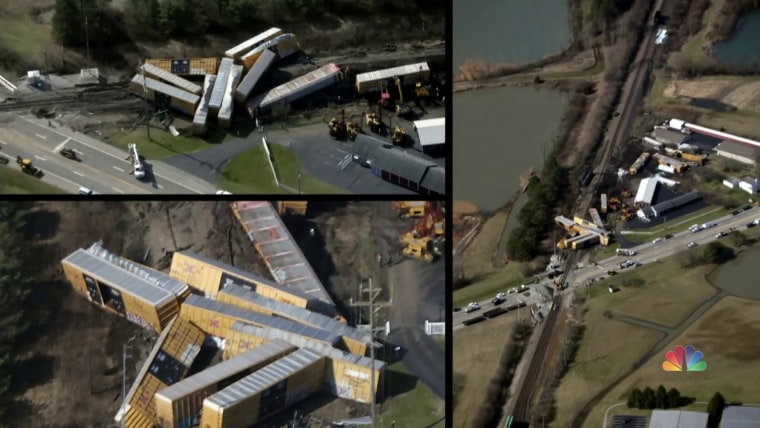[ad_1]
WASHINGTON — Facing mounting scrutiny, Norfolk Southern CEO Alan Shaw is facing lawmakers Thursday in his first appearance on Capitol Hill Thursday since the Feb. 3 train derailment that led to a toxic chemical spill, controlled burn and mass evacuation in East Palestine, Ohio.
The Norfolk Southern Railway CEO is testifying in a hearing of the Senate Environment and Public Works (EPW) Committee, as senators plan to grill him about clean-up efforts and a spate of recent accidents involving the rail company.
Shaw told lawmakers that he is “deeply sorry” for the impact the Ohio train derailment has had on the people of East Palestine and neighboring communities and that he is “determined to make it right,” in his opening statement.
“We will clean the site safely, thoroughly, and with urgency,” Shaw told members. “You have my personal commitment.”
This week, the National Transportation Safety Board (NTSB) said it was launching a special investigation of Norfolk Southern Railway’s organization and safety culture. Since December 2021, NTSB said it had launched investigation teams to five significant accidents involving Norfolk Southern, including on Saturday when a freight train derailed near Springfield, Ohio, and on Tuesday when a Norfolk Southern employee was killed during a collision.
The company announced a six-point plan on Monday to begin addressing safety concerns.
EPW Chairman Tom Carper, D-Del., said that Norfolk Southern appears to be cooperating with the government order and has agreed to pay for the environmental cleanup. But, Carper said, the rail company has not been fully forthcoming to victims in East Palestine.
“An apparent lack of transparency on the part of Norfolk Southern, at least in the early days of the response, has left some members of the community battling with mistrust and looking for answers,” Carper said in his opening remarks, noting that Norfolk Southern failed to communicate to first responders that it would do a controlled burn on five rail cars.
First responders “were under the impression that only one car would be vented and burned, rather than five,” the chairman added. “This miscommunication left first responders scrambling to ensure the public safety requirements of a much larger plume.”
Shaw, who has been president and CEO of Norfolk Southern since May 2022, is appearing Thursday alongside Debra Shore, a regional administrator for the Environmental Protection Agency; Anne Vogel, director of the Ohio Environmental Protection Agency; and local officials who can speak to the environmental impact of the derailment on the community.
The hearing began at 10 a.m. ET with an initial panel of lawmakers: Ohio’s two senators, Democrat Sherrod Brown and Republican J.D. Vance, as well as Sen. Bob Casey, D-Pa., who testified ahead of Shaw.
Residents in East Palestine have said they are fearful and anxious about potential exposure to hazardous chemicals following the derailment there, with some avoiding the drinking water, despite assurances by federal officials that the air and water and safe.
The EPA has ordered Norfolk Southern to clean up any soil and water contamination and to pay for it.
Shaw on Thursday detailed how the company is working with the EPA on a long-term removal plan that will guide testing on the quality of the water, air and soil. And he stressed the importance of providing financial assistance to affected residents, noting that the company has committed to reimbursements and investments of more than $21 million, aiding 4,400 families and first responders in East Palestine.
“All of this is just a downpayment,” Shaw said. “To be clear, there are no strings attached to our assistance. If residents have a concern, we want them to come talk to us.”
As of Monday, at least 18 lawsuits had been filed against the company.
The Biden administration is also facing some criticism at the Thursday hearing. West Virginia Sen. Shelley Moore Capito, the top Republican on the panel, took aim at the EPA during her opening statement and in Wednesday’s call with Carper and reporters.
“Personally, I think the EPA failed. … There was confusion, there was delayed data, and a sense that nobody really cared. So, if you’re thinking about somebody in your home, you evacuate, you come back, is your water safe, is the air clean?” Capito said Wednesday.
“So we’re going to ask, you know, why did it take the EPA administrator three weeks before he actually drank the water? He was telling everybody it was safe. Why did it take a month to establish a response center?”
[ad_2]
Source link

